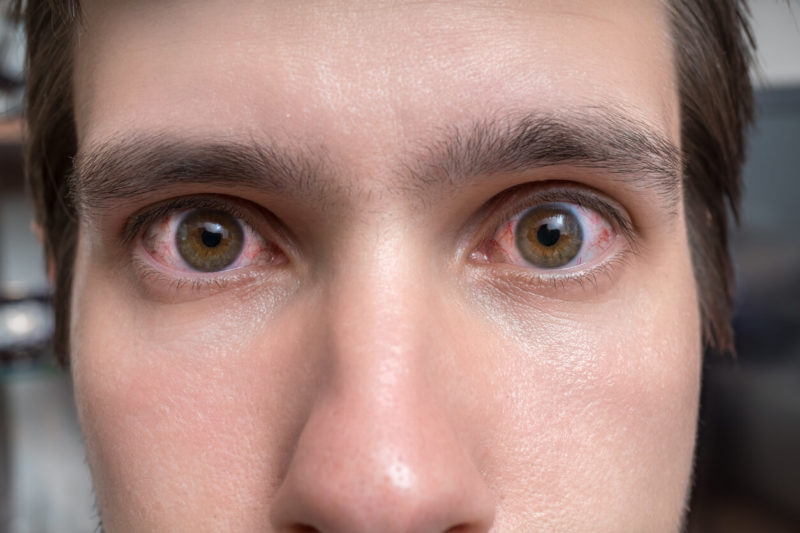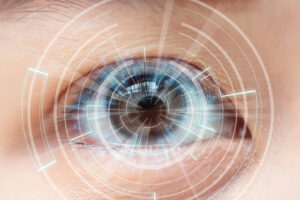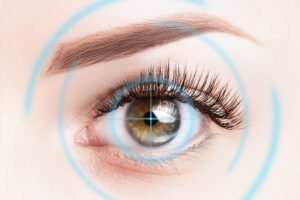
Allergic conjunctivitis is a type of pink eye (conjunctivitis) caused by exposure to allergens. It rarely presents the same dangers as viral or bacterial conjunctivitis
Most cases of allergic conjunctivitis are caused by allergens that spread easily in the air:
- Dust
- Pet dander
- Ragweed
- Pollen
- Mold
- Pollution/Smog
Sometimes, allergic conjunctivitis results from exposing the eye to irritants like chlorine in a pool, or non-hypoallergenic makeup. Contacts lenses and even contact lens cleaning fluid can also cause an allergic reaction if they become contaminated.
While conjunctivitis is unpleasant, rest assured that the answer to the question “is allergic conjunctivitis contagious?” is a solid No.
Seasonal Allergic Conjunctivitis Treatment: Ease Symptoms and Remove Allergens
The symptoms of allergic conjunctivitis are often uncomfortable and can become severe if the patient is exposed to something highly irritating to him or her. Typical symptoms include:
- Red or pink coloring in the sclera (white part of the eyes)
- Sore and/or itchy eyes
- Swollen eyelids
- Pain in and around the eyes
Seasonal allergic conjunctivitis is generally triggered by seasonal allergies that can occur at any time of the year. Pollen and ragweed allergies usually occur in the spring, summer, and fall. The reactions they trigger can be treated or even prevented with antihistamine medications taken orally or with allergy eye drops, or artificial tears.
Sometimes these irritants can be removed or at least reduced.
- Daily showering and frequent shampooing can rid the body and hair of pollen and ragweed.
- Wash clothes and bedsheets more often during allergy season.
- During heavy pollen or ragweed days, consider wearing glasses instead of contact lenses. Otherwise, wear sunglasses to protect your eyes when you go outdoors and limit your time outside.
- Pollen is highest in the mid-morning and early evening, so avoid being outdoors at those times if possible.
- Keep windows and doors closed during allergy season. Pay particular attention to vacuuming and cleaning near doors, where people may bring in allergens from outside.
Perennial (Non-Seasonal) Allergic Conjunctivitis Treatment
Not all allergies are seasonal. Many people have year-round allergies that have nothing to do with ragweed or pollen.
In my opinion, an allergy to pet dander is the most difficult to live with because it’s often like being allergic to a family member. Many people are also allergic to dust and dust mites, which tend to accumulate most during colder weather when doors and windows are kept shut, but can trigger reactions — including conjunctivitis — at any time.
Talk to your physician about allergy medications that are safe to take on a regular basis. You may be prescribed oral medication and/or eye drops. Here are some other ways to control pet dander and dust:
- Regularly vacuum and damp-dust the home. Use a vacuum cleaner with a HEPA filter. Clean or replace it when it becomes clogged.
- Brush pets regularly and bathe them every two weeks or so to reduce dander and shedding without harming them. Wash pet bedding as well.
- If you suspect your pet “borrows” your bed when you aren’t around, be sure to regularly wash bed covers, pillow cases, and bed sheets.
Mold is another allergen that can strike at any time, even in the cleanest homes. It’s a good idea to have your air conditioner and heating units cleaned and inspected at least once a year, change filters every two months and more often if you live in an area with monsoons or dust storms. Use cleaners with bleach in bathrooms and kitchens; be sure to wear rubber gloves when using these cleansers.
Visit our blog to read more about other types of eye conditions and eye care.
Contact our Manhattan NY – Eye Care Center.
Contact Us
If you have more questions about LASIK procedures, get in touch with us.
Related Blogs

Timing is Everything: When to Consider LASIK After Nursing for Optimal Results
Timing is everything when considering LASIK eye surgery after nursing, and understanding the optimal period for this procedure is vital for both mother and baby.

Cataract Surgery: Restoring Clarity and Confidence
Cataract surgery is a transformative procedure that offers a new lease on clear vision and renewed confidence. As cataracts cloud the eye’s lens, causing blurred

Intralase LASIK Explained: What to Expect Before, During, and After the Procedure
Intralase LASIK is a cutting-edge procedure that offers a safe, effective, and precise way to enhance vision compared to traditional LASIK methods. Understanding what to
